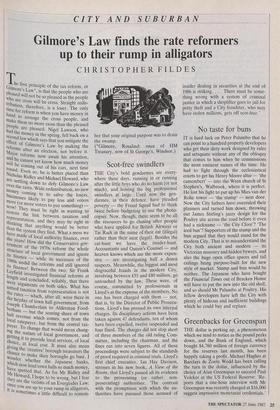CITY AND SUBURBAN
Gilmore's Law finds the rate reformers up to their rump in alligators
CHRISTOPHER FILDES
The first principle of the tax reform, or Gilmore's Law*, is that the people who are pleased will not be so pleased as the people who are cross will be cross. Straight redis- tribution, therefore, is a loser. The only time for reform is when you have money in hand to assuage the cross people, and make them no more cross than the pleased people are pleased. Nigel Lawson, who had the money in the spring, fell back on a second law which says that you mitigate the effect of Gilmore's Law by making the reforms after an election, not before it. Major reforms now await his attention, and he cannot yet know how much money Will be coming out of his ears, next time round. Even so, he is better placed than Nicholas Ridley and Michael Howard, who are settling down to defy Gilmore's Law over the rates. Wide redistribution, no new money coming in to salve the losers, businesses likely to pay less and voters more (or more voters to pay something) WOW! They must be right in wanting to restore the link between taxation and representation, and they may be right in. thinking that anything would be better than the system they find. What a mess we have made of local authority finance, over the years! How did the Conservative gov- ernment of the 1970s reform the whole structure of local government and ignore its finance — while its successor of the 1980s undid the reforms and still ignored its finance! Between the two, Sir Frank Layfield investigated financial reforms at length and concluded, reliably, that there were arguments on both sides. What has untied taxation from representation is not the rates — which, after all, were there in
the heyday of town hall government, from Jose rn Ph Chamberlain to Alderman Food-
botharn — but the soaring share of town hall revenue which comes, not from the local ratepayer, but from the central tax- payer. To change that would mean chang- ing the nature of local government, and getting it to provide local services, of local choice, at local cost. It must also mean giving the 'creative' borough treasurers the chance to make their boroughs go bust. I Wonder whether the Japanese banks, which now lend town halls so much money, have spotted that. As for Mr Ridley and Mr Howard, I hope to be wrong, but I fear they are the victims of an Everglades Law: once you are up to your rump in alligators, it is sometimes a little difficult to remem-
ber that your original purpose was to drain the swamp. (*Gilmore, Rosalind: once of HM Treasury, now of St George's, Windsor.)









































































 Previous page
Previous page